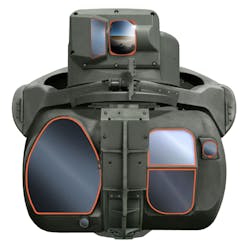Army picks Lockheed Martin to upgrade electro-optical targeting sensors in AH-64 Apache attack helicopter
REDSTONE ARSENAL, Ala. – U.S. Army aviation experts needed electro-optical assemblies to upgrade the Target Acquisition Designation Sight/Pilot Night Vision Sensor (M-TADS/PNVS) system, also known as Arrowhead. They found their solution from Lockheed Martin Corp.
Officials of the Army Contracting Command at Redstone Arsenal, Ala., announced a $22.1 million order Friday to the Lockheed Martin Rotary and Mission Systems segment in Orlando, Fla., for Modernized Day Sensor Assembly (M-DSA) kits and spare parts for Army AH-64 Apache attack helicopters.
The lower M-TADS turret contains the targeting system, which has day and night electro-optical sensors. The M-DSA has updated laser rangefinder designator, TV Sensor, and laser spot tracker components -- elements of which were designed in the 1970s.
The M-DASA kits are helping to upgrade the entire DSA system to enhance performance, mitigate the effects of obsolescence, and increase the M-TADS/PNVS ability to accommodate weapons now in production.
The Arrowhead targeting sensor suite, deployed in 2005, modernized the forward looking infrared (FLIR) elements of the TADS and the PNVS. This modernization effort will provide modern technological and precision engagement, and will ensure the Army’s Apache helicopter remains an effective attack helicopter well into the future.
Its laser rangefinder designator includes an eye-safe rangefinder and day sensor electronics unit, which replace the laser transceiver unit and related electronics in the Apache’s legacy day sensor assembly.
The new day sensor structure assembly offers fields of view that match the Arrowhead FLIR fields of view to accommodate image blending. The modernized TV sensor incorporates color and low-light sensitivity. A modern inertial measurement unit replaces three spinning-mass gyros, and the new laser spot tracker uses a four-quadrant detector and improved processing. A laser pointer marker helps enhance coordination with ground and air units.
M-DSA upgrades enable Apache flight crews to identify targets at long ranges through an additional field of view and extended range picture-in-picture capability, as well as provide the ability to view high-resolution, near-infrared and color imagery on cockpit displays.
M-DSA also provides a new laser pointer marker that improves coordination with ground troops, and an updated multimode laser with eye-safe lasing capability that supports flight in urban environments and home-station training.
M-TADS/PNVS provides Apache helicopter pilots with long-range, precision engagement and pilotage capabilities for mission success and flight safety during day and night and in adverse weather conditions.
On this order Lockheed Martin will do the work in Orlando, Fla., and should be finished by November 2024. For more information contact Lockheed Martin Rotary and Mission Systems online at www.lockheedmartin.com, or the Army Contracting Command https://acc.army.mil/contractingcenters/acc-rsa/.
About the Author
John Keller
Editor-in-Chief
John Keller is the Editor-in-Chief, Military & Aerospace Electronics Magazine--provides extensive coverage and analysis of enabling electronics and optoelectronic technologies in military, space and commercial aviation applications. John has been a member of the Military & Aerospace Electronics staff since 1989 and chief editor since 1995.
